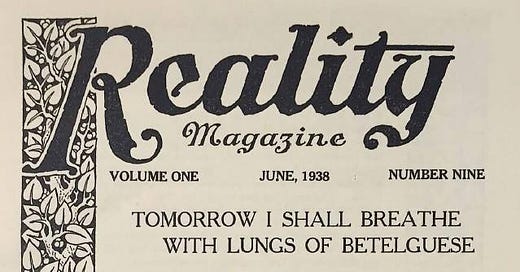In some way I have permitted myself to become entrapped in this garment of fleshly form. I have taken Limitation unto myself. I have died into worldly life. Right now I am dead –for I am not Myself.
So long as the sacs of my body control my moods, dictate my arisings and my reclinings, create my hungers and my passions, then it follows that I cannot be Myself. I am my body, I am the organs of my flesh, I am the reactions from the insistences of my environments.
Once I was free. Yet I made the discovery that being free, unless I created my own world and proceeded to live therein, freedom meant nothing but sterility to my spirit. My spirit was only pleased with itself when it made combat with that which was outside itself, that might never be termed any part of itself, that gave it contest and threatened it with menace.
-from Reality Magazine, vol. 1, no. 9, June, 1938, continued at: http://iapsop.com/archive/materials/reality_pelley/reality_v1_n9_jun_1938.pdf
‘Lungs of Betelgeuse’ is perhaps the most Lovecraftian of all Pelley’s writings. Appearing as the opening article in an issue of his metaphysical magazine Reality, it is likely a channeled message, or intentionally couched in the style of a channeled message.
It is not characteristic of Pelley’s oeuvre. The narrator is a sentient intelligence finding itself trapped in mortality, if only for a little while. It communicates the core message of Soulcraft in a way palatable to readers of contemporary weird fiction: That each lifetime is a classroom requiring specific limitations in order to impart its lessons.
It is also a message of reassurance that our current condition, however daunting, is necessary and temporary. Grander vistas await.
Pelley and horror writer H.P. Lovecraft could have had a fascinating correspondence. WDP was a dog person. HPL was a cat person. Pelley sought to elevate the human spirit. Lovecraft seemed to adhere to the school of cosmic insignificance. I imagine many thought-provoking conversations between the two carrying on into the wee hours.
Was either aware of the other? Difficult to know without any published reference by one to the other. I have never seen such evidence. It is likely that Lovecraft heard of the Silvershirts. It is even possible that he was curious about them. Did he mention them, or Pelley, in any of his voluminous correspondence? A thorough search should tell us, but I have found none.
Lovecraft is an interesting parallel to Pelley. Lovecraft worked his way up through the amateur journals to the early pulp horror and sci-fi genre magazines and only met with great acclaim after his death. Pelley’s literary career follows a near opposite trajectory, publishing in the echelon of popular national magazines only to become a cult writer with a following of eccentrics. At some point the reach of their writings might have overlapped. How many subscribers to Liberation in 1933 might also have been readers of Weird Tales? And wouldn’t that reading list have made for a very peculiar sort of individual?
This is as good a place as any to introduce my old friend Guy Harwood, last of the Asheville Silvershirts. When I met him in 1995 he was one of the most unusual minds I had ever encountered. Looking back across the intervening years, I’m quite sure I’ve never met a more strange person. I cannot confirm that he ever read Lovecraft, but he would have been right at home with a dog-eared issue of Astounding Stories in his hands.
A parting note re: H.P. Lovecraft. His most devoted fans amount to a cult. There are dozens of acolytes as equally obsessed with HPL as I am with WDP. He also has a reputation as a racist and rightist. Some fans waste a lot of ink apologizing or justifying his views. Many more, I think, are attracted to him because of his unpopular perspective, whether they admit it publicly or not.
Lovecraft also courts a legion of followers who are writers. There are entire subgenres devoted to Lovecraft imitation and fan fiction. Some such literature is self-published and circulated only between fellow contributors. This is the very spirit of the amateur journals which first published the work of Lovecraft, now recognized as the 20th century’s Poe.
Within this contingent of writer fans there have been scattered creative references to Pelley within a Lovecraftian context. The most interesting such fantasy piece that I have yet seen, again falling within the category of alternate history or variant timeline fiction, supposes that William Dudley Pelley had read Lovecraft’s story ‘Call of Cthulhu’ while still ensconced in Hollywood and helped him sell the screenplay, making it one of Universal’s first talking horror films.
Read this curious pop-culture “What If?” mash-up here: https://efanzines.com/Chunga/pdfs/chunga-09-hires.pdf
-tbc-





